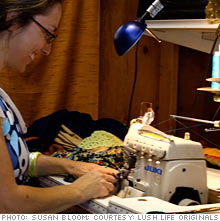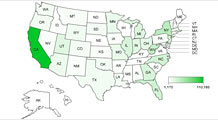Stimulus billions fund rural broadband Internet
For businesses in rural America, fast Internet connections remain a scarce luxury. A $7 billion stimulus program aims to narrow the digital gap.
 |
| Designer Alexis Gault relies on Internet access from a nonprofit local provider to keep her business connected to its customers. |
 |
| Gault models one of her designs. She sells her custom clothing online to customers around the U.S. |
WASHINGTON (CNNMoney.com) -- Fast Internet access is a luxury most businesses take for granted these days, but in remote areas of the country, the staticky crackle of a dial-up modem connection remains a familiar sound. A $7.2 billion stimulus initiative aims to expand broadband access and speed up the modem's extinction.
Two federal agencies, the Commerce Department's National Telecommunications Information Administration (NTIA) and the Agriculture Department's Rural Utility Service, each landed billions from the Recovery Act to fund new broadband infrastructure projects. Applications are due this week for the first wave of grants and loans from those programs.
For entrepreneurs in rural areas, a broadband connection can be an economic lifeline. Alexis Gault lives in Asheville, a city of 74,000 at the mountainous western edge of North Carolina. After losing her $8 an hour job as a photographer's assistant, she decided to turn her part-time hobby into a full-time career. Gault launched Lush Life Originals, a custom clothes line she sells online.
She relies on a speedy Internet connection to send clients e-mails with high-resolution images, maintain her Web site, and keep up with her site's e-commerce. But it's not a connection she takes for granted: Gault's Internet provider is a local nonprofit, the Mountain Area Information Network (MAIN), that relies on grants and fundraising to supplement its service fees.
"Time is literally my money. If I'm not sewing, I'm not making money," Gault says. "If someone orders something and it's not in stock any more, I don't have to run to the library to use their broadband connection to update my Web site."
Charter Communications offer DSL (digital subscriber line) service in Gault's neighborhood, but she is not able to afford its higher monthly fees.
Wally Bowen, MAIN's executive director, sees a direct connection between Internet access and economic prosperity. "One thing that we've learned is that people started making significant progress in their lives when they started using the Internet," he says. "They were able to start new businesses, manage their health care insurance and medicine online, and get more job training."
MAIN has been operating as a nonprofit in North Carolina's rural mountains since 1996. The group got its start with an NTIA grant to build infrastructure to give the area's residents dial-up Internet access through a local phone call. MAIN also introduced Internet access at local public libraries and community centers.
In 2003, MAIN expanded to offer high-speed wireless connections. Today, the organization serves 1,200 dial-up subscribers in 14 counties, 400 wireless subscribers across four counties, and hosts some 450 Web sites. Outside of MAIN, residents face few choices. DSL lines and higher-speed broadband are available from larger firms in the town center and immediate outlying area, but not much further.
"Six out of 10 people who want our wireless broadband service can't get it," Bowen says.
He sees wireless technology, which get around the region's hollows and hills, as the best and most immediate broadband solution for residents. But there's very limited spectrum available for him to offer customers service, a problem he's looking to the Federal Communications Commission to fix. The FCC took action last year to free up more spectrum for situations like these, but it has yet to issue protocols on how technology should operate within the spectrum. Until it moves forward with those rules, none of the spectrum that was freed is available for use.
MAIN, working with several partners, is angling for a $50 million grant from the $7.2 billion stimulus funding pool for broadband projects. That coalition is looking to build an optical fiber network that would bring broadband access to residents in three counties. MAIN is also seeking a separate grant to build out wireless broadband to local public housing, community centers and fire stations.
Without the federal funds, MAIN can't afford to roll out those services. Things would remain "status quo," Bowen says.
That's an option the U.S. can't afford if it wants to retain its global lead as a technology innovator. America is now ranked 15th in the world on broadband access, according to the Organization for Economic Cooperation and Development. It was No. 1 in the mid-1990s.
The digital gap within the country is widening. More than two-thirds of U.S. households now subscribe to a broadband service, compared to just one-fifth five years ago, according to recent data from Leichtman Research Group. But in rural America, only 31% of residents have a broadband connection, according to the Pew Internet and American Life Project. The rural West leads in broadband connections, while the South is the worst laggard, census data says.
Sascha Meinrath, director of the Open Technology Initiative at Washington think tank New America Foundation, says lawmakers need to recognize that the state of the nation's broadband is an enormous, looming problem.
"Countries decades ago realized that you need to invest in highways if you want to have a modern economy," Meinrath says. "Those countries that didn't invest have been left behind. In the digital era, there will be those countries that don't invest and get left behind."
Not every region in need of a broadband buildout has turned to the government for money.
The city of Powell, Wyo., raised $6.5 million from private investors to build a high-speed fiber-to-the-home network for its 5,500 residents. The network took three years to build, and just launched in May. Qwest Communications (Q, Fortune 500) provides communications services in the area, but Logan says Qwest's connections are slower than the city's project.
"We've figured out an innovative way of funding this without taxpayers' money and without state, local or federal money," says Powell City Administrator Zane Logan.
TCT West, a regional communications company based in Basin, Wyo., is the city's service provider and has an exclusive contract with Powell for six years. "We're providing the infrastructure in the city, and we are giving TCT the ability to provide services and set rates," says Logan. "The idea was to keep businesses downtown and to attract more professional, technical-type businesses."
Logan has been down a similar path before. He was hired in 1992 as the city's electrical superintendent and worked to completely overhaul the local grid, from the substation to residents' houses. "It took 12 years, but one of the reasons I did that is because when a business comes to town they want to know who is your power company and how reliable is it," he says. "That got me to thinking about telecom."
He thinks the city's Internet gamble is already paying off: "Existing businesses here are expanding," Logan says. "People can stay at home and get as good and fast of a connection as in a big city."
Powell's broadband project has another economic fringe benefit: TCT West has been hiring Powell residents for customer service, installation and tech support.
The first step toward improving the nation's broadband infrastructure is finding out where the problem spots are. Some $350 million of the Recovery Act's $7.2 billion funding pool has been earmarked to map the country's broadband use and highlight which regions have high-quality access. The idea was put forward in a bill signed by President Bush last year, but the measure didn't allocate any funding for the initiative. The money showed up in President Obama's stimulus package.
Drew Clark, executive director of BroadbandCensus.com, a trade publication tracking the broadband stimulus funding, says better mapping data could be a boon for small businesses.
"A public and transparent map will be useful to helping businesses invest," he says. "You want to locate your business where there is broadband or where there's likely to be broadband. You need to know where the interstate highway type of connections are and where the dirt roads are."
The Federal Communications Commission has also been charged with presenting lawmakers with a national broadband plan by Feb. 17, 2010. One of its goals is to get affordable broadband to as many people as possible. The FCC is taking a flood of public comments on the matter and must digest them as part of putting together its recommendations. The issues it is grappling with include defining terms like "affordable broadband" and "underserved."
"We can restore economic vitality to underserved areas that for decades have not had the benefit of this IT knowledge base," says MAIN's Bowen. "People like [Microsoft cofounder] Bill Gates and others in Silicon Valley are bright people, but they had access to social capital to incubate and nurture them. The social capital has been drained out of rural America for several decades now. We can fix that." ![]()
-
The Cheesecake Factory created smaller portions to survive the downturn. Play
-
A breeder of award-winning marijuana seeds is following the money and heading to the U.S. More
-
Most small businesses die within five years, but Amish businesses have a survival rate north of 90%. More
-
The 10 most popular franchise brands over the past decade -- and their failure rates. More
-
These firms are the last left in America making iconic products now in their twilight. More









